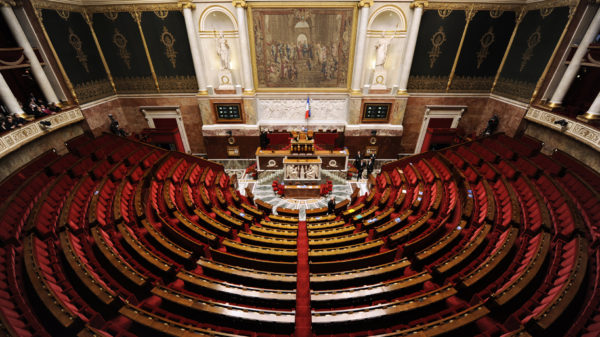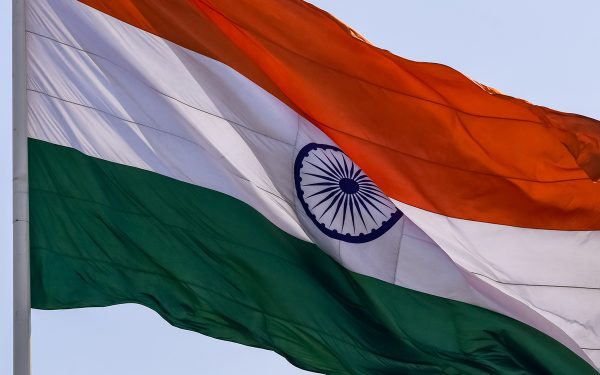World
Out in the World: LGBTQ news from Europe and Asia
Latvia’s civil unions law took effect Monday

LATVIA
Latvia’s law allowing same-sex couples to form civil unions came into effect Monday, and the first queer couples have already registered their unions in the Baltic nation.
Maksims Ringo and Janis Locs were the first same-sex couple to register their civil union. They did so in a ceremony at a legal office in the capital, Riga, where they exchanged silver rings, stating that they were saving gold rings for a date when Latvia legalizes same-sex marriage.
“I feel excited, kind of emotional about it as well because it is a really big step and not only for us, for the country itself. And being first, it’s all the publicity that comes with it as well. It kind of is a bit, I would say, a bit stressful, but at the same time I feel happy that we can finally do it,” Locs told Reuters.
Latvia amended its constitution to ban same-sex marriage in 2005, but in 2020, the Constitutional Court ruled that the state must give same-sex couples the same benefits that straight married couples have. In 2022, a deadline imposed by the court lapsed, and couples began applying to the courts to have their relationships recognized.
Last year, the Latvian parliament finally passed a law formalizing same-sex civil unions, but the compromise legislation has frustrated some LGBTQ activists in the country as it leaves out key rights demanded by same-sex couples. Latvia’s civil unions do not allow couples to adopt children, nor do they get key inheritance rights, they’re concluded at a notary office instead of at the civil registry, and the government still will not recognize foreign same-sex marriages.
The bill was also bitterly opposed by conservative, anti-LGBTQ groups. They attempted to force a referendum to block the bill but were unable to come up with the required signatures before the legal deadline.
With legal civil unions in Latvia, all but five EU countries recognize some form of same-sex union: Lithuania, Poland, Slovakia, Bulgaria, and Romania.
In neighboring Lithuania, a civil union bill awaits a final vote in parliament but has stalled amid infighting between liberal and conservative factions of the coalition government. This week, the liberal faction threatened to block the appointment of a European commissioner unless the conservatives agreed to pass the bill.
In Poland, the governing coalition appears to have finally agreed to pass a civil union bill, albeit one that has been watered down significantly. The resulting bill will not allow any adoption rights, nor a common surname, and will be concluded by notaries and without a ceremony rather than civil registries. The government hopes to bring the bill forward this month.
The European Court of Human Rights has ruled that all member states must provide some form of civil union to same-sex couples to be in compliance with the nondiscrimination and family rights guaranteed by the European Convention on Human Rights.

FRANCE
Voters gave a big boost to the far-right National Rally party in Sunday’s first-round parliamentary elections, with the Rally taking 33 percent of the vote, while the left-wing New Popular Front took 28 percent, and President Emmanuel Macron’s centrist Together bloc took 21 percent.
Parties are now jockeying for voter support in the second round, and NPF and Together have begun discussions at mutual endorsements to block the National Rally.
In France’s system, if no candidate in a given district wins 50 percent of the vote, the top two vote-getters, and any candidate who gets at least 12.5 percent of registered voters advances to the second round, which is decided by plurality vote. Because of higher-than-usual turnout of 67 percent, there are a large number of three-way races in the second round — over 300 according to official results, when the previous record was 76.
The left-wing NPF has announced it will withdraw any candidates who advanced and placed third on the ballot, in order to create a “republican front” against the National Rally. While Macron has not made a formal statement on withdrawing third-place candidates, his prime minister, Gabriel Attal, has called on third-place candidates to step aside.
The National Rally has a long history of campaigning against LGBTQ rights but has not made that central to its program in this election, where it has focused on pocketbook issues and rejection of immigration. The National Rally has long opposed same-sex marriage, and its current leader has campaigned and voted against allowing lesbians to access IVF and supports a bill to ban gender care for minors.
Several reports have emerged of National Rally supporters committing homophobic attacks in France.
A group of National Rally supporters allegedly attacked a gay teenager in Paris after the results of last month’s European Parliament elections were announced and National Rally was shown to win the largest number of sets. They were reported to have shouted “You’ll see when Bardella is in power and Hitler comes back!” and “In three weeks, we will be able to smash up f*gs as much as we like. I can’t wait.” The attackers were arrested.
GEORGIA
A package of extreme anti-LGBTQ bills sailed through first reading in the Georgian parliament on a 78-0 vote that was boycotted by most of the country’s opposition parties.
Georgia has been rocked by protests since the governing Georgian Dream party introduced a passed a “foreign agents” law, which requires any organization that receives funding from out of the country to register with the government as a foreign agent. The law was inspired by a similar law in Russia and was designed to undermine opposition groups, media, and nongovernmental organizations that are often critical of the government.
The anti-LGBTQ bills are an extreme package of legislation that was also inspired by Russia. The bills ban recognition of any same-sex relationships, forbid recognition of gender other than birth sex, forbid any medical treatment for gender change, and criminalize any advocacy for LGBTQ rights. The government says it hopes to pass the legislation by the fall ahead of national elections in October.
The bills are also designed to undermine the opposition, by forcing them to defend LGBTQ rights, which remain deeply controversial in the conservative Christian country. Opposition leaders have also made it clear that their boycott of the bill does not mean they support LGBTQ rights.
Both the anti-LGBTQ bills and the foreign agents bill have put the country on a collision course with the EU, which it has expressed a desire to join, and which granted it candidate status last year.
EU accession is very popular among the Georgian public, but the Georgian Dream party is more closely aligned with Russia, and frequently demonizes the EU by equating its values with LGBTQ rights.
Last week, EU candidates Moldova and Ukraine opened formal negotiations to join the bloc, although it is expected that it will be many years before membership is granted.

INDIA
The high court of India’s Kerala state upheld the right of LGBTQ people to live autonomously, as it rejected a petition from the parents of a 23-year-old who sought to have their daughter committed to a mental institution to “treat her sexual orientation.”
The young woman had fled her family and was living with her partner, a transgender man. Her family members repeatedly attempted to violently abduct her from her new home.
The court ruled that the woman has a right to live her life on her own terms and that sexual orientation is an innate part of a person’s identity.
The court also directed the parents to hand over all of their daughter’s personal documents, which they had been withholding, in an attempt to force her to return to them, and the court warned the family against committing violence against her.
Same-sex relationships are not illegal in India, although last year the Indian Supreme Court ruled that the government does not have to recognize same-sex marriage, leaving that question to parliament.
HONG KONG
Ten same-sex couples from Hong Kong were legally married in the U.S. over the internet this week, in a mass ceremony to celebrate Pride week.
The 10 couples took advantage of a program available through the state of Utah, which allows people to get married via an internet ceremony.
Utah has become a go-to destination for same-sex couples seeking to get married even though they live in countries that don’t recognize same-sex marriage. Utah allows couples to get married even if they’re not physically present in the state, while most states require couples to at least be present, if not resident in the state.
Hong Kong does not currently allow same-sex marriage, although last year its Court of Final Appeal ruled that the local government should offer some form of relationship recognition to same-sex couples within two years. That deadline comes up next September.
“In Hong Kong, there’s not yet a way to go to a marriage registry to get married, but there’s still this way we can offer for them to realize their dreams of getting married,” wedding organizer Kurt Tung told the Associated Press.
Argentina
Gay, nonbinary parent fights for family in Argentina’s courts
Leonardo Hatanaka alleges they were fired after requesting paternity leave

An unprecedented case could set an important legal precedent for the rights of labor rights for LGBTQ families in Latin America.
Leonardo Hatanaka, a Brazilian pharmaceutical professional, expects an imminent ruling from the Superior Court of Justice in the Autonomous City of Buenos Aires in a case that alleges discriminatory dismissal based on sexual orientation, gender identity, and xenophobia after their son Matteo’s birth in Argentina via “solidarity gestation.” Human rights organizations and international agencies have followed the case closely.
Genzyme de Argentina S.A. and Sanofi in 2023 fired Hatanaka weeks after they notified them of their son’s paternity and requested 180-day parental leave.
“Matteo’s birth was the realization of a dream and the right to form a family with love, dignity and equality, even if that means having to fight every day for our family to be recognized as such,” Hatanaka told the Washington Blade in an exclusive interview.
The National Institute Against Discrimination, Xenophobia and Racism, a government agency known by the acronym INADI that President Javier Milei’s administration has shut down, in November 2023 said Hatanka’s termination was motivated by discrimination based on sexual orientation and gender identity.
(Milei took office in December 2023.)
The General Directorate of Coexistence in Diversity in Buenos Aires’s government in 2024 said institutional xenophobia motivated the firing.
“I am a gay man, foreign, nonbinary, and I had requested to exercise my right to parental leave,” Hatanaka explained. “The company denied access to a basic right to care, which it does provide in other countries, and did not provide any medical coverage for our son, despite his legal registration with both parents’ names.”
Sanofi did not acknowledge responsibility, offer apologies or any kind of reparations, despite the two rulings.
“It was devastating. I was caring for a newborn, at a moment of enormous vulnerability, and the company chose just that moment to abandon us,” said Hatanaka.
The National Labor Court overturned an initial injunction that ordered Hatanaka’s reinstatement. Hatanaka appealed the decision to the Superior Court of Justice in the Autonomous City of Buenos Aires.
“I hope for justice; that the discrimination suffered is recognized, and that this ruling serves as a precedent for all diverse families and LGBTQ+ people who are seeing their rights violated,” said Hatanaka.
The Argentine LGBT Federation, SOS Homophobie in France, and Mothers of Resistance in Brazil are among the organizations that have expressed their support. The latest U.N. report on anti-LGBTQ discrimination also notes the case.
“Companies must go beyond marketing,” Hatanaka emphasized. “Real inclusion requires concrete actions, consistency, and respect for their own policies.”
Hatanaka stressed that “there are instruments such as the UN Guiding Principles on Business and Human Rights. It is time for them to comply with them.” The lawsuit has also become a symbol of the struggle for equality and protection of families with parents who are the same sex.
“I feel I represent many LGBTQ+ families who live in fear of losing everything by exercising their rights,” said Hatanaka. “LGBTQ+ parenting is legitimate, real and deserves protection. No family should be punished for existing.”
Myanmar
LGBTQ advocacy group joins Myanmar earthquake relief effort
March 28 quake killed thousands, devastated country’s second-largest city

A powerful earthquake that rocked Myanmar on March 28 unleashed devastation across the central part of the country.
The U.S. Geological Survey measured the quake at 7.7, and pinpointing its epicenter roughly 10 miles west of Mandalay, the country’s second-largest city. A 6.4-magnitude aftershock jolted the area 12 minutes later, compounding the destruction and deepening the crisis for a nation already strained by conflict.
The earthquake struck with terrifying intensity near its epicenter, wreaking havoc on Mandalay and the nearby city of Sagaing.
Mandalay, a bustling city of approximately 1.5 million residents, bore the brunt of the destruction. Among the most striking losses was the 12-story Sky Villa Condominium, which collapsed, leaving scores trapped beneath the wreckage. Rescue workers scrambled to pull survivors from the rubble, but the rising death toll underscored the tragedy’s magnitude.
In Sagaing, which is located closer to the epicenter, more than 70 percent of buildings sustained damage. The Ava Bridge, an essential artery spanning the Irrawaddy River, collapsed, cutting off a critical connection to Mandalay. The earthquake’s shallow depth of less than seven miles amplified its power, reducing homes, temples, and schools to rubble.
The earthquake’s death toll continues to climb, with at least 3,649 confirmed dead, more than 5,000 injured, and approximately 145 people missing. Amid the widespread devastation, questions loom about the impact on vulnerable populations. The Washington Blade reached out to Colors Rainbow, an organization advocating for LGBTQ rights in Myanmar, to understand how the crisis has affected one of the nation’s most marginalized communities.
Colors Rainbow Executive Director Hla Myat Tun spoke about how his organization is working to address the crisis faced by Myanmar’s LGBTQ community in the aftermath of the earthquake.
Colors Rainbow has implemented a system of multipurpose cash transfers, directing funds to local LGBTQ partner organizations. These grassroots partners, in turn, provide essential support to affected individuals that includes emergency cash assistance, food, non-food items, clean water, and basic emotional support tailored to the immediate needs of their communities.
“We estimate that around 500–800 LGBTQ individuals have been impacted in the affected areas, particularly in Mandalay Region, Sagaing Region, and southern Shan state,” said Hla Myat Tun. “So far, we have been able to directly assist around 80–100 LGBTQ individuals.”
Hla Myat Tun told the Blade that Colors Rainbow is actively gathering data to assess the specific challenges that LGBTQ people are facing in the aftermath of the earthquake.
Preliminary observations, he noted, point to heightened vulnerability among LGBTQ people, driven by social exclusion and limited access to mainstream humanitarian aid. Hla Myat Tun, however, emphasized more comprehensive information is necessary to fully understand the scope of their needs and vulnerabilities in this crisis.
“We are partnering with international LGBTQ and feminist organizations that focus on displaced communities,” said Hla Myat Tun. “These partners provide emergency funds, and we coordinate with local LGBTQ groups to deliver aid directly to affected individuals on the ground.”
Addressing reports of military restrictions on humanitarian aid, Hla Myat Tun explained how Colors Rainbow is managing to reach LGBTQ people who are in conflict zones and areas the military junta controls. Hla Myat Tun highlighted the importance of the organization’s trusted local LGBTQ partners, who are embedded in these regions. Their presence and established networks, he said, are vital in navigating restricted areas and ensuring that aid reaches the LGBTQ people who are most in need.
Hla Myat Tun also provided insight into how Colors Rainbow is tailoring its relief efforts to meet the LGBTQ community’s specific needs.
He said his organization is gathering information directly from LGBTQ people through close coordination with its local partners, relying on both formal and informal communication channels. Hla Myat Tun told the Blade his team conducts daily check-ins via quick telephone calls, ensuring a continuous flow of information to guide their response efforts despite limited internet access, electricity and other challenges.
“Our approach is collaborative — we set strategies and share responsibilities to respond flexibly and safely, based on the rapidly changing local context,” he said. “Personal stories are being documented, but for security reasons, we are cautious about sharing them publicly.”
When asked whether staff or volunteers had harassment, discrimination, or violence while delivering aid — a concern given the precarious legal and social climate for LGBTQ people in Myanmar — Hla Myat Tun said there have been no reported incidents thus far.
“So far, we haven’t received any reports from our staff or local partners about harassment or violence while delivering aid,” he noted, emphasizing Colors Rainbow remains vigilant and has implemented robust safety protocols to protect all involved.
Colors Rainbow relies primarily on funding from international LGBTQ-focused partners. He noted, however, humanitarian funding specifically dedicated to LGBTQ communities remains vastly under-resourced, relative to the pressing needs on the ground. Hla Myat Tun said this shortfall severely limits the scale and reach of Colors Rainbow’s efforts.
“While Myanmar’s legal framework remains outdated, societal attitudes — especially during the civilian government — have shown signs of progress,” said Hla Myat Tun. “We have seen positive change thanks to the work of local LGBTQ organizations.”
“In the current crisis, many communities are working together despite legal barriers. However, in areas without LGBTQ-led organizations, inclusive humanitarian responses are still lacking,” he added. “There’s an urgent need for international humanitarian actors to understand and implement LGBTQ-inclusive practices in Myanmar.”
When asked about long-term strategies to support the recovery and resilience of LGBTQ communities as Myanmar rebuilds, Hla Myat Tun affirmed Colors Rainbow is deeply committed to fostering resilience. The organization’s initiatives include leadership development, community empowerment through training and workshops, sub-granting programs, and organizational development support. He also highlighted Colors Rainbow’s advocacy for LGBTQ-inclusive policies and collaboration with ethnic groups to promote an inclusive federal democracy, and specifically thanked Outright International, a global LGBTQ and intersex rights group, for “amplifying our work.
“This kind of international attention shines a spotlight on the challenges LGBTQ communities in Myanmar are facing and helps open doors for more support,” Hla Myat Tun told the Blade. “It also boosts visibility and solidarity, both locally and globally, which we deeply appreciate.”
Hungary
Hungarian MPs amend constitution to ban public LGBTQ events
Viktor Orbán’s government spearheaded amendment

Hungarian MPs on Monday voted to amend their country’s constitution to ban public LGBTQ events.
The vote took place less than a month after lawmakers banned Pride events and gave authorities the green light to use facial recognition technology to identify those who participate in them.
The Associated Press notes MPs approved the constitutional amendment — which Prime Minister Viktor Orbán’s Fidesz-KDNP coalition government proposed — by a 140-21 vote margin. Authorities before the vote removed a group of protesters who tried to block the entrance to a parliament parking garage.
Orbán’s government over the last decade has moved to curtail LGBTQ and intersex rights in Hungary.
A law that bans legal recognition of transgender and intersex people took effect in 2020. Hungarian MPs that year also effectively banned same-sex couples from adopting children and defined marriage in the constitution as between a man and a woman.
An anti-LGBTQ propaganda law took effect in 2021. The European Commission sued Hungary, which is a member of the European Union, over it.
MPs in 2023 approved the “snitch on your gay neighbor” bill that would have allowed Hungarians to anonymously report same-sex couples who are raising children. The Budapest Metropolitan Government Office in 2023 fined Lira Konyv, the country’s second-largest bookstore chain, 12 million forints ($33,115.76), for selling copies of British author Alice Oseman’s “Heartstopper.”
Former U.S. Ambassador to Hungary David Pressman, who is gay, participated in the Budapest Pride march in 2024 and 2023. Pressman was also a vocal critic of Hungary’s anti-LGBTQ crackdown.
The Washington Blade has reached out to Budapest Pride for comment on the constitutional amendment.
-

 Opinions4 days ago
Opinions4 days agoIt’s time for new leadership on the Maryland LGBTQIA+ Commission
-

 The White House4 days ago
The White House4 days agoWhite House does not ‘respond’ to reporters’ requests with pronouns included
-

 Arts & Entertainment4 days ago
Arts & Entertainment4 days ago‘Gay is Good’ Pride Pils Can Celebrates Frank Kameny’s 100th Birthday for WorldPride in D.C.
-

 Sponsored5 days ago
Sponsored5 days agoTHC Drinks: What You Should Know About Cannabis Beverages











